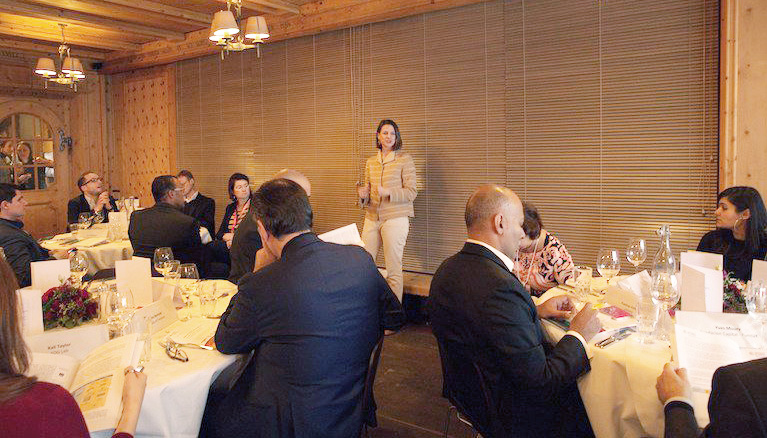Discussing innovation in IOs at the World Economic Forum
Tina C. Ambos, Professor of International Management and Academic Director of the IO-MBA, hosted an insightful luncheon on harnessing innovation in IOs at Davos World Economic Forum on January 23rd 2019. She invited the private sector, IOs, iNGOs, social entrepreneurs and academics to work together and to unleash bottom-up innovation, which is more than ever needed to meet the Sustainable Development Goals (SDGs).
But innovation is not for the sake of innovation
Under the aegis of Yves Flückiger, Rector of the University of Geneva, and with the participation of leading representatives from various IOs, Tina Ambos raised several calls to action:
- Problem-driven innovation. Innovation must be driven by finding solutions. SDGs will only be met by 2030 with rapid and all-encompassing solutions.
- Opening the culture and skills. Organizational culture must trigger innovation and IOs must accept the risks it entails.
- Changing the system. Institutional barriers threaten the success, and even the happening, of intrapreneurs’ actions to get the organization to the next level. Current systems are too compliance focused.
Creating agile organizations
Addressing these challenges will require new forms of collaboration and to push IOs from within to change the systems stifling innovation. Agile organizations are becoming a necessity in an environment where risk and failure are accepted.
IO-MBA’s curriculum is strongly based on the needs of the IOs and prepare graduates to harness the transition towards agile organization to open up the way of solving global problems together.

Some quotes of the luncheon
"Let’s use this Geneva cluster more efficiently. Let’s find concrete ways to share knowledge and design agendas together.” Dr. Maximilian Martin, Global Head of Philanthropy, Lombard Odier Group
“Innovation is not for the sake of innovation and should not be confused with the use of tools. It is important to identify and articulate what is the problem to be addressed through innovation. Then, it is most important to set performance indicators and measure whether the problem was successfully addressed, so we can get feedback and improve the process. It is critical to break the silos. (...) The role of universities is pivotal in the process. Universities are the facilitators, the gatekeepers. Universities provide the neutral meeting ground for interactions (...) .” Spiro N. Pollalis / Research Professor of Design Technology and Management / Harvard Design School
The luncheon gathered the following leading representatives:
- Olga Algayerova, Executive Secretary of the United Nations Economic Commission for Europe
- Pradeep Kakkatil, Head of Innovation, UNAIDS
- H.R.H. Prince Jaime de Bourbon de Parme, Senior Advisor, Private Sector Partnerships UNHCR
- Thierry Agagliate, Head of Disruptive Innovation Unit, Terre des Hommes
- Kileken ole-MoiYoi, Head of the Novartis Africa Health Alliance
- Thibaut Ferté, Food Innovation, Louis Dreyfus Company
- Robert Opp, Director of Innovation and Change Management Division, World Food Programme
6 Feb 2019



